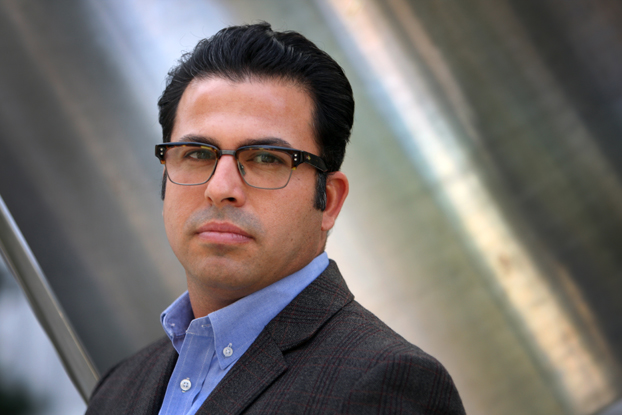 Caption: Erualdo R. Gonzalez is researching the connection between obesity and urban planning. Photo by Karen TapiaDownload Photo
Caption: Erualdo R. Gonzalez is researching the connection between obesity and urban planning. Photo by Karen TapiaDownload Photo
University Initiative: Health Care
Health and Building Connection
Targeting Obesity Through Urban Planning Research
ONE WAY to combat obesity might be to provide more open space for such things as walking and biking trails in dense cities. Another might be to provide healthy alternatives to junk food snacks and sodas at schools.
But, how do such proposals reach policymakers and elected officials? And, how do you successfully convince them to adopt obesity-fighting measures, especially in low-income, overcrowded areas where residents are poor and underserved?
Those are two of the questions being pondered by Erualdo R. González, assistant professor of Chicana and Chicano studies, who is conducting a two-year study to examine how policymakers determine policy changes aimed at increasing physical activity among Latino youth.
“I’m studying attitudes and decisions related to the policies they implement or not,” González said. “I want to see why they — planning commissioners, city council members and other policymakers — do what they do in the fight against obesity.”
González has been awarded a $75,000 grant from the Robert Wood Johnson Foundation through its New Connections program for his research project. The foundation, a national health philanthropy, works to improve America's health and health care.
“In comparison to the general population of the United States, Latinos have higher birth rates, are younger, account for more immigration, are more likely to live in overcrowded places, have less access to open and recreational spaces, and are the fastest-growing sector of the working class,” González said.
“Research tells us that Latino youth in the United States have the highest rates of obesity among the young,” he said. “These demographics and heavily-populated environments and health challenges virtually ascertain that Latinos will continue to have a significant presence and stake in planning in the United States. But, we know very little how these communities are engaging in planning and policy change activities around obesity. Moreover, there is an opportunity to examine the difference it is making, or not, and why, from the policy side. And, this grant is providing me the opportunity to add to this body of knowledge.”
As part of his research, he is exploring which communities — that are part of the Robert Wood Johnson Foundation’s “Communities Creating Healthy Environments” initiative — could be ideal candidates for his research, because they have active residents organizing to improve their health via advocacy campaigns.
He also is working with a team of evaluators at Loyola Marymount University to evaluate the initiative, which supports diverse, community-based organizations and indigenous groups nationwide in developing and organizing effective, culturally competent policy initiatives that address the root causes of childhood obesity.
“I’m looking at open spaces, such as parks, walking trails and other recreation areas and how they are used, and what infrastructure issues, such as lack of street lights, they might face,” said González, an urban planning expert.
“Some communities believe that they don’t have adequate or any resources in their neighborhoods,” he added. “Some areas have no safe places for people to walk or to perform any kind of outdoor exercise, and people ask why certain populations are obese. But, health and obesity go beyond the individual level. For example, why don't people exercise in their neighborhoods? Could it be because there are no well-lit parks or walking trails? To get such things in their neighborhoods, community members often have to engage in advocacy campaigns.”
González said it is important to figure out how community members work and can work in the future to improve their environments for the betterment of their health.
“There is an intersection between community health and urban planning,” he said. “What I want to find out is to what extent do policymakers' attitudes and perceptions of communities advocating for improvements play in their decisions for or against them. How do they view particular tactics or strategies? What works?”
Obesity in this country has been declared an epidemic by the U.S. surgeon general, and therefore, “we need to gain knowledge and understanding on what is happening in our cities and communities right now,” he added.
Nov. 17, 2011
